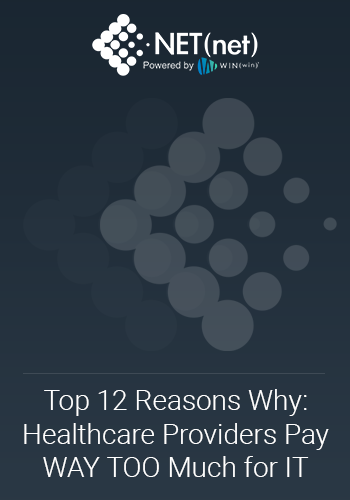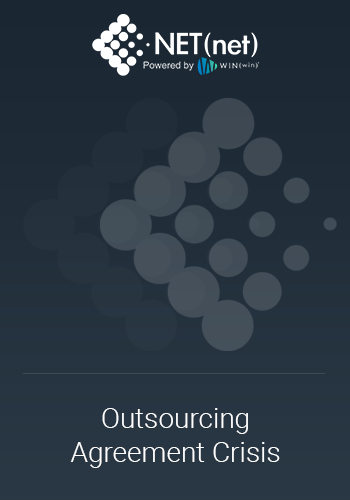Healthcare organizations pay an unnecessary premium for IT systems, software and services. The reasons are many; NET(net) identifies the Top 12 in our White Paper.
With all the focus on reducing Healthcare costs, it may surprise you to learn that of the 30 industries we recently sampled, Healthcare organizations actually pay more for technology than any other industry. Our analysis shows Healthcare organizations pay an average 17% more than that of the other 29 industries we sampled, and 33% more than the industry with the lowest average costs (food service). In this blog series, we outline why we believe Healthcare providers pay way too much for information technology.
Reason #10. Increased Government Regulation
The American Recovery and Reinvestment Act (ARRA2009) contains a number of significant Healthcare related provisions that, among other things, provide for increased matching Medicaid payments to states and new prevention and wellness funds for preventative Healthcare.
Perhaps the most meaningful provision for Healthcare in ARRA is the $19.2 Billion of funding designed to help revamp our nation’s health information technology (HIT). This funding is intended to encourage physicians, hospitals and other Healthcare providers to adopt and accelerate the use of electronic health records (EHR) to exchange patients’ health information electronically, which will conceivably reduce costs by improving quality, safety, and efficiency; reportedly saving billions of dollars each year. Among other benefits, proponents believe that the electronic exchange of patients’ records will improve accuracy and result in a reduced number of inappropriate tests and procedures, reducing paperwork and administrative overhead, and decreasing the number of adverse events resulting from medical errors. Hospitals are eligible for additional Medicare payments if they are “meaningful EHR users.” Payments for hospitals are based on a formula that multiplies up to $6,370,200 (if a hospital discharges up to 23,000 patients in a payment year) by the percentage of Medicare- eligible inpatient bed days a hospital has during a given payment year.
If, as part of the stimulus spending bill, a Healthcare organization is awarded a $2M benefit to digitalize its patients’ records, and a technology supplier just so happens to come up with a solution that costs $2M to furnish that Healthcare organization with that capability, the Healthcare organization views that as a win.
What if the actual cost of that technology was half that amount? If the government does not align Healthcare organizations’ incentives with cost effective remedies, Healthcare organizations will continue to overpay for solutions, and will do so without so much as a second thought, especially when the investment does not really cost them anything.
The Other 11 Reasons:
12. Healthcare IT is Oversimplified – read blog post here
11. Unprecedented Change and Mandate for Business Sustainability – read blog post here
9. Industry Centricity
8. Lack of Strategic Sourcing
7. Industry Specific Supplier Programs
6. Single Purpose Purchasing
5. Supplier Lock-In
4. Healthcare Organizations Don’t Always Negotiate Diligently
3. Healthcare Systems Are Often Inefficient and Difficult to Automate
2. Healthcare Organizations Often Lack a Profit Motive
1. Healthcare Organizations Focus on Patient Care and Safety
We do expect an information intensive industry like Healthcare to demand considerably more technological investments in order to power critical patient care as well as manage organizational decisions. However, we do not expect the difference at this level or at this scope. Healthcare organizations pay more for all types of technology, from Lawson financial applications, to Microsoft desktop productivity licenses, to Cisco networking equipment, to IBM servers, to EMC storage arrays, and so on. These overpayments extend to the vertical applications for Healthcare like those provided by Epic, McKesson, Cerner, and others. The breadth of scope of this “Healthcare premium” indicates that this is not an industry specific difference for one type of technology unique to Healthcare, but rather a general premium that applies to all technology.
In future blogs, I will go into more detail on each of the other reasons outlined above. If you cannot wait for future posts when we go into specific on the other 11 reasons, click here now. NET(net) helps Healthcare providers build better, more sustainable business partnerships with key technology suppliers, focused on value for the long term.
NET(net)’s Website/Blogs/Articles and other content is subject to NET(net)’s legal terms offered for general information purposes only, and while NET(net) may offer views and opinions regarding the subject matter, such views and opinions are not intended to malign or disparage any other company or other individual or group.
About NET(net)
Celebrating more than 10 years, NET(net) is the world’s leading IT Investment Optimization firm, helping clients Find, Get and Keep more economic and strategic value. With over 1,500 clients around the world in nearly all industries and geographies, and with the experience of over 15,000 field engagements with over 250 technology suppliers in XaaS, Cloud, Hardware, Software, Services, Healthcare, Outsourcing, Infrastructure, Telecommunications, and other areas of IT spend, resulting in incremental client value captured in excess of $100 billion since 2002, NET(net) has the expertise you need, the experience you want, and the performance you demand. Contact your NET(net) representative, email us today at info@netnetweb.com, visit us online at www.netnetweb.com, or call us at +1-866-2-NET-net to see if we can help you capture more value in your IT investments, agreements, and supplier relationships.

















